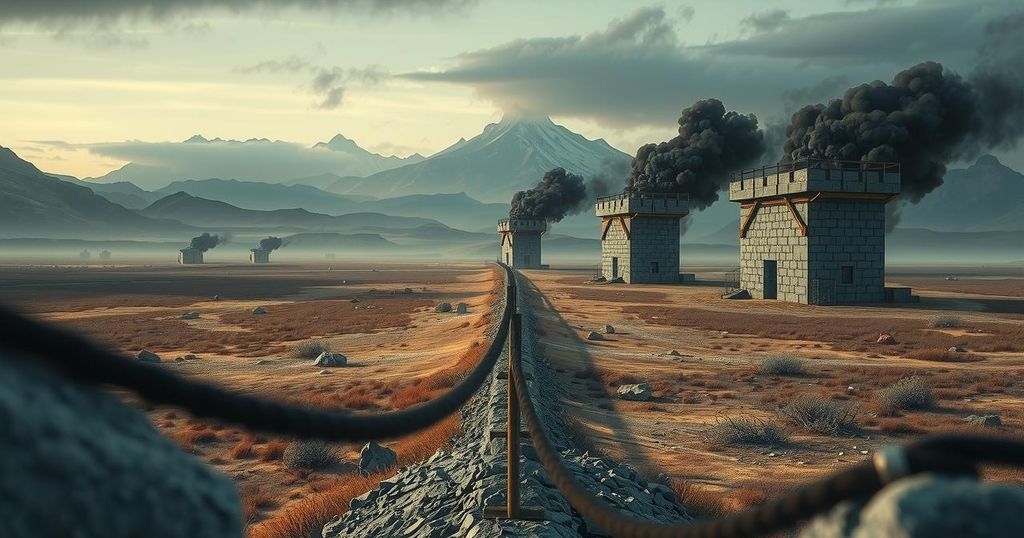World news
AFRICA, BIN, BINTOU KEITA, CIVIL WAR, CONGO, CONGO (KINSHASA), DEMOCRATIC REPUBLIC OF CONGO, GOMA, HUMANITARIAN, HUMANITARIAN CRISIS, KENYA, KIDNAPPING, KIVU, M23, MU, NAIROBI, NORTH KIVU, PATRICK, POLICE DEPLOYMENT, SAFARI KANYAGALA PATRICK, THE WASHINGTON POST, U. N, U. N. SECURITY COUNCIL, UNITED NATIONS, WAR
Elena Martinez
0 Comments
Escalating Violence in Goma: M23 Rebels Clash with Government Forces
A crisis is unfolding in Goma, DR Congo, as the M23 rebel group engages in fierce clashes with government forces, trapping residents amid bombardments. Reports indicate significant fighting, with calls for calm from M23 leaders as government troops still operate in parts of the city. The crisis is compounding years of violence, with increasing calls for international intervention as the humanitarian situation worsens dramatically.
On Monday, a crisis deepened in the Democratic Republic of Congo as the Rwanda-backed M23 rebel group engaged in intense clashes with government forces in Goma, the capital of North Kivu province. Residents expressed fear and confusion amidst ongoing bombardments, with many unable to escape due to blocked roads. One resident, Safari Kanyagala Patrick, remarked, “We are surrounded; there is no place to go.” Fighting began the previous day, leaving local citizens feeling trapped. Another Goma resident recounted that they had been confined to their home for more than a day.
M23 spokesman Lawrence Kayuka announced the “liberation” of Goma, urging Congolese military personnel to surrender and calling for calm among the populace. However, journalist Jimmy Bakomera reported that government forces still maintained a presence in parts of the city. A recent statement by the Uruguayan army indicated that M23 was actively clashing with Congolese troops, leading to the surrender of over 100 soldiers.
During an emergency meeting of the U.N. Security Council, Bintou Keita, the head of the U.N. stabilization mission in Congo, confirmed that access to Goma had been severely restricted. She stated, “In other words, we are trapped.” In just two days, three U.N. peacekeepers were reported killed, and several others injured. Furthermore, the commander of North Kivu was killed in recent fighting, with rebels also advancing into neighboring South Kivu.
The M23 group, primarily consisting of members from the Congolese Tutsi ethnicity, previously seized Goma in 2012. Their resurgence threatens to instigate further violence in the mineral-rich nation, which has seen approximately six million war-related deaths since 1996. The U.N. estimates that the current fighting has displaced about 400,000 people in North and South Kivu in recent weeks alone.
U.N. Secretary General António Guterres called on Rwanda to cease its backing of the M23 and to withdraw from Congo. Meanwhile, the U.S. Embassy in Kinshasa has urged American citizens to leave North Kivu while routes remain open amid escalating violence.
The Democratic Republic of Congo (DRC) has faced prolonged instability and violence, particularly in its eastern regions where numerous armed groups operate. The M23 rebel group, predominantly composed of members of the Congolese Tutsi ethnic group, has been a significant player in this ongoing conflict, having previously taken and briefly held Goma in 2012. The region’s rich resources have attracted both domestic and international interests, complicating the dynamics of power and conflict, leading to catastrophic humanitarian crises, including mass displacements. International bodies, including the United Nations, have been involved in attempts to stabilize the region, but recurring violence continues to challenge efforts toward peace and security. The involvement of neighboring Rwanda has further complicated the situation, raising concerns about sovereignty and regional security as calls for accountability grow louder. Recent clashes have heightened fears of a return to widespread conflict, threatening countless civilian lives and disrupting efforts for recovery in a region deeply scarred by decades of war.
The situation in Goma remains precarious as fighting between the M23 rebel group and Congolese government forces continues to rage, displacing thousands and instilling fear among residents. The escalating crisis has prompted international calls for intervention and the withdrawal of foreign support for the rebels. With both humanitarian and geopolitical stakes high, the urgent need for a lasting resolution has never been more critical to prevent further destabilization and loss of life in the region.
Original Source: www.washingtonpost.com




Post Comment